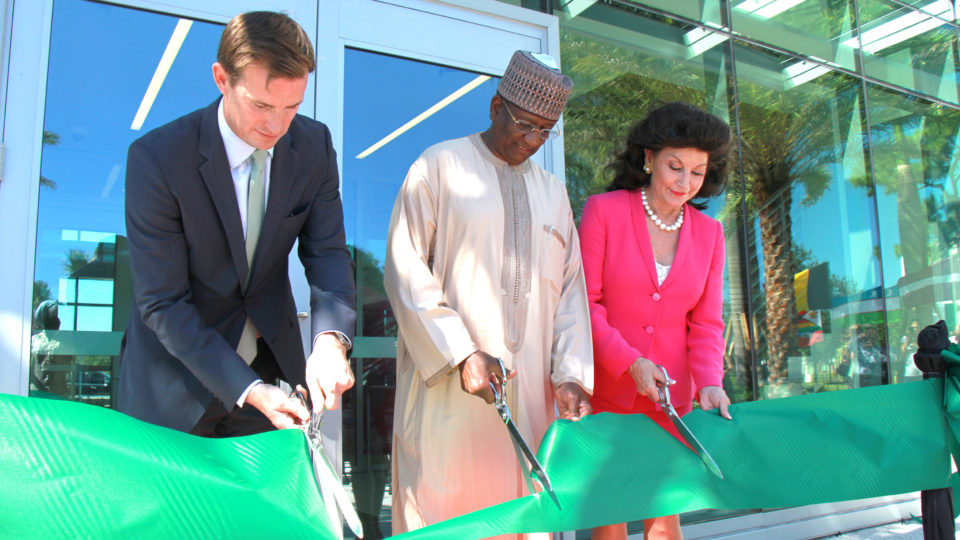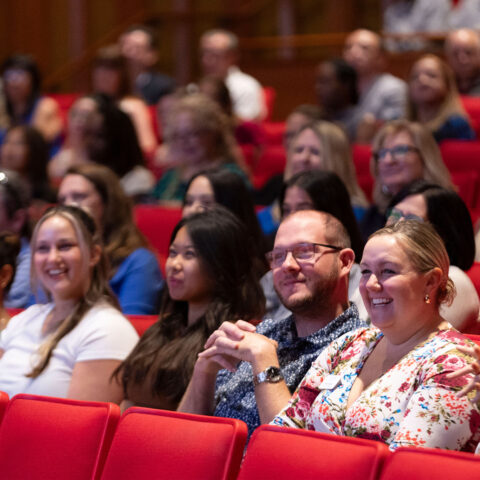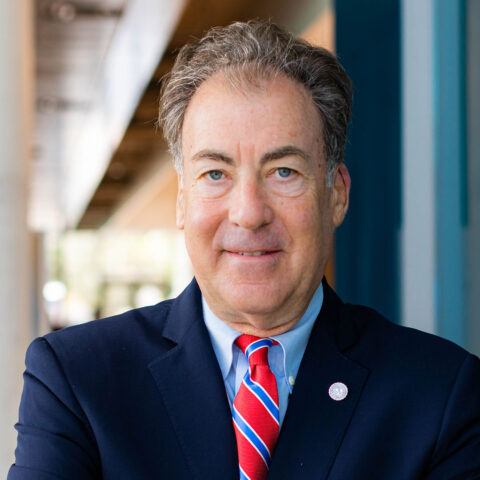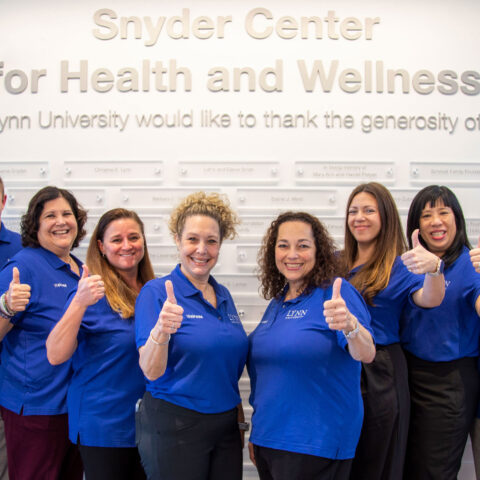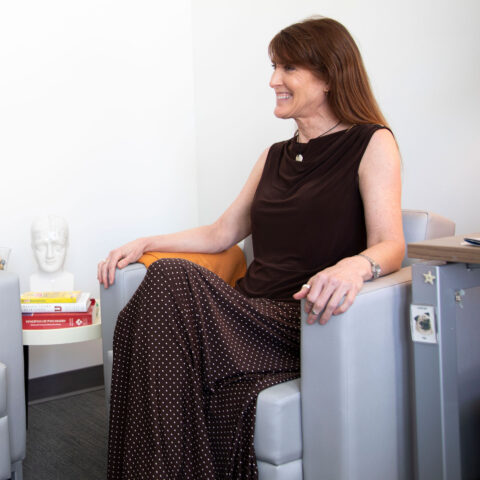Lynn University is on a mission to build a better world with its students. And when it comes to the College of Business and Management—home to more than 1,000 students from nearly 70 countries—that means staying at the forefront of innovation, training and best practices in an ever-changing, global business world.
The Mohammed Indimi International Business Center is custom built for entrepreneurial studies and represents a transformation in Lynn’s learning environment, free of formal and structured spaces. The center adopts best practices from Silicon Valley to Wall Street, with collaborative workspaces and the latest technologies—all designed to enhance the Lynn experience.
“The Indimi International Business Center propels business education at Lynn University to an entirely new level,” says President Kevin M. Ross. “With this magnificent new facility, Lynn is poised to become a leader in entrepreneurial studies.”
Adds Gregory J. Malfitano, senior vice president for development and administration, “We planned this building for a long time, and it is a spectacular addition to our campus—it’s a game-changer. Our students and future generations of Lynn students are ensured a first-rate business education here.”
Lead donor Alhaji (Dr.) Muhammadu Indimi’s investment is not just financial; his connection is very personal: Eight of his children have attended Lynn. Because of his generosity, Lynn now has a 32,000-square-foot international business center designed to support the university’s student-centered, real-world style of teaching and learning.
Learning in a rich environment
The center’s open floor plans, natural lighting and simplicity of design are seamlessly merged with state-of-the-art technology, giving students a rich environment in which to learn and explore.
“Curiosity is at the heart of what drives people to learn and discover, and we designed the building to capture people with this emotion", says Cliff Bollmann of Gensler, the company that designed the building. The building is bright inside and out thanks to nearly 100 percent tempered glass construction. White walls and glass partitions provide not only privacy, but also transparency, which showcases student interaction and collaboration
Eleven classrooms and 10 collaboration areas range from adaptable rooms for 20 to 30 students, to three ground-level suites that can be combined into a multiuse space for more than 100 people. Several spaces are dedicated to creating the environment for self- and small group-directed learning.
Teaching spaces on all three floors open into large common areas and can be configured based on need, giving students the flexibility to move, collaborate and creatively express themselves.
The spaces were designed to foster conversation and promote an open flow of dialogue among students, faculty and business experts. The Arnold Goldstein Lecture Suites’ three classrooms can be combined into one large space for events that bring students and the wider business community together, such as Lynn’s celebrated Chief Executive Officer (CEO) Lecture Series.
The flexibility allows instructors to create in-depth learning experiences, whether through real-time discussions with industry experts or small group experiences online.
Fashion management students have their own space to study the business and management fundamentals of fashion design and demonstrate their sales and marketing know-how. Budding designers not only build their designs in the building’s Sabrina Simone Fashion Classroom, but also display their creations in the commercial windows that overlook the building’s expansive lobby.
Transforming teaching and learning
In his new corner office overlooking campus, Ralph Norcio, senior associate dean, breaks into a wide smile when speaking of the new home of the College of Business and Management.
“Students feel more professional,” he says, “and they have a sense of pride.” He adds that the study spaces created for them to work together enhance collaboration.
“Technology allows you to take abstract ideas and make them real to students so they learn better and more easily,” he says. Students are already comfortable with technology, he says, and now they have all the “bells and whistles.”
Lecture-capture technology permits collaboration regardless of classroom configuration and enables faculty to produce content for their classes and students to create media presentations.
Students also give high marks to the building’s technology. “People expect our generation to know how to use technology, so all of this is important now for our studies and afterward when we graduate,” says Veronika Jouklova, an international business major enrolled in Lynn’s accelerated bachelor’s degree program, Lynn 3.0. “It’s amazing to have something like this here.”
Wall Street meets Lynn
In the Peter O’Neill Investment Center, professors engage students through modern projection technologies that mimic professional trading environments, enhancing students’ familiarity with the tools and systems they’ll interact with and operate in the real world. And students get a hands-on glimpse into the daily activities of financial services professionals.
Lopez treats his classes as “real life,” and students are graded on how much money they “make” as part of the coursework. He brings in guests from the financial arena to share their knowledge and work with students on the terminal.
Leo Kryss, founder and CEO of Banco Tendencia—one of the largest brokerage houses in Brazil—and multibillion-dollar hedge fund manager David Horowitz have visited Lopez’s classes several times, using the Bloomberg Terminal to explain investment strategies.
Spaces for real-world experience
Lynn places experience at the center of student learning, and employers increasingly are looking to hire graduates with “real-world experience”—even though they have yet to enter the workforce. The Indimi Center answers this need with a dedicated space where students can forge new ideas and explore internship opportunities throughout their academic careers.
Within the center’s Beyond the Classroom offices, students work with and learn hands-on from partner companies. Here, organizations—the first contract is with CDI Global—create on-campus internship experiences, especially helpful for students who do not have access to internships for a variety of reasons, including lack of personal transportation. These businesses also can work from Lynn, which facilitates networking and partnerships.
In the center’s Snyder Idea Lab, part of Lynn’s Center for Entrepreneurship, students from all disciplines collaborate with local entrepreneurs, professors and mentors to learn how to transform their start-up concepts into ready-to-launch businesses.
A model for future generations
Since 2006, Lynn has completed several key projects according to its campus master plan, including new and upgraded entrances, a new perimeter road, the Central Energy Plant and Bobby Campbell Stadium. Lynn’s newest building, the Mohammed Indimi International Business Center, was envisioned for 21st-century education and, as such, is a model for future campus development.
In planning the center, administrators worked closely with faculty and students who agreed that traditional classroom models—confined within a traditional facility with traditional delivery—were insufficient for the next generation of international business leaders. Instead, they needed a space in keeping with modern-day business, which requires 21st-century values and skills—including critical thinking, creativity, teamwork and collaboration.
The Indimi Center is a shining example of a space dedicated to student success, expanding relationships with businesses and organizations, and ensuring that future generations of young entrepreneurs begin their careers with a first-rate education.
Key facts: The Mohammed Indimi International Business Center
Design firm: Gensler
Contractor: Gerrits Construction
Construction began: March 22, 2013
Dedicated: Oct. 16, 2014
Square footage: 32,000
Height: 3 floors
Cost: $14.5 million
Students: More than 1,000, from over 70 countries
A model of sustainability
The Mohammed Indimi International Business Center is a testament to Lynn’s social and financial sustainability initiatives, with:
- 41 percent projected overall energy savings
- Anticipated LEED Platinum certification, the highest level of sustainable design certification awarded by the United States Green Building Council
- 87 percent reduction in potable water use
- 29 percent reduction in electricity use for lighting
- 83 percent diversion of construction debris from landfills
- A sun shade system and exterior “curtain wall” for reduced heat and glare, yet still permitting external views for 90 percent of the center’s occupants
- Interior finishes comprising recycled and low-emitting materials for improved air quality
